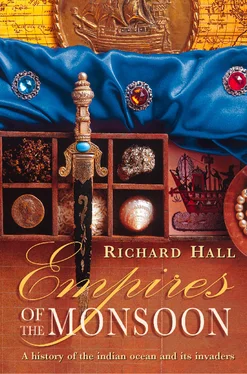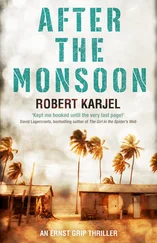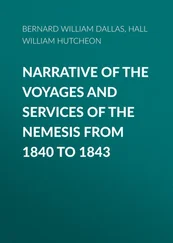Portugal was small, poor and ignorant, but its pride was formidable. The ruling dynasty had won the loyalty of the people, shortly after coming to power, for having fought off Castile’s attempt to conquer them in the final decades of the previous century. Confidence had also been raised by the king’s marriage ties with England: his queen was Philippa of Lancaster, and among courtiers in Lisbon the legends of Camelot and its knights were favourite reading. The eldest of the Portuguese princes, Duarte, Pedro and Henry, took part in the fighting at Ceuta and immediately after its capture they were dubbed knights by their father. Queen Philippa had encouraged them in feats of arms (not for nothing was she the daughter of John of Gaunt) but was denied the pleasure of welcoming them home from their triumph at Ceuta; as they were returning she died of the plague.
In their plundering of Ceuta’s well-built houses the Portuguese were astounded by the silks from China, the silver-embroidered muslins from India and many other luxuries. ‘Our poor homes look like pigsties in comparison,’ admitted one Portuguese chronicler. The curiosity of the royal princes was aroused by the stories they heard from their captives about the interior of Africa, beyond the peaks of the Rif mountains overlooking Ceuta. They learnt about the Sahara desert to the south, across which the camel caravans journeyed to a ‘River of Gold’. 2One account said that on the river bank there were ants the size of cats, digging up gold and leaving it in heaps for humans to collect. This ancient myth of gold-digging ants was readily believed. Like everyone else in Europe, the Portuguese knew virtually nothing about Africa and assumed it to be populated by monsters and cannibals.
Depictions of Mali’s long-dead king, the Mansa Musa, seated on a golden throne, had been inserted on medieval maps of Africa merely to fill up space and hide the ignorance of cartographers. As recently as 1410, Ptolemy’s Geography had been ‘rediscovered’ from Arab sources, but it was more misleading than helpful. A few secretive Genoese, Catalans and Jews controlled the northern end of the desert trade in gold, in towns where caravans reached the Mediterranean, but even they knew little about the source of the metal. Isolated in their tiny enclave at Ceuta, the Portuguese had no way of taking part in the Saharan trade.
Every rumour picked up in Ceuta about African gold was of compelling interest to King John, because his country was so painfully short of the metal. The price of gold had risen several hundred times in Lisbon within a few decades. 3It was a matter of pride for any country to mint its own gold coinage, acceptable as payment for imports, but John’s treasury was too empty for that; so Portugal used the currency of richer neighbours, including that of ‘infidel’ Morocco.
The prestige earned by Ceuta’s capture was soon overlaid with greater issues in Europe. The Catholic Church was convulsed by the ‘Great Schism’, with rival popes contending for power, and by a surge of revolt against the dictates of Rome; a famous Bohemian heretic, Jan Hus, had been burned at the stake a few weeks before the occupation of Ceuta. Any attention that could be spared from religious disputation tended to be directed towards the east, and the advance into Europe of the Ottoman Turks, former nomads from the Asian steppes. Constantinople was in peril. The Turks had by-passed Byzantium’s great citadel, choosing instead to cross the Bosphorus into Europe and overrun most of the Balkans; but everyone knew that they would, in their own time, turn back to lay siege to Constantinople itself. Despite the Castilian reconquest of almost all of Andalusia, rarely had the threat to Christendom seemed greater. The thirteenth-century dreams of an all-conquering alliance with the Mongols were dead. Islam was resurgent and the Ottoman Turks were its spearhead.
This was, in consequence, a moment when the known world, stretching from China to the Atlantic, was more physically divided than ever. Asia’s overland route, along which Marco Polo and countless other merchants once travelled and which the Mongols had kept open, had been effectively shut to Christian travellers for a century. A few missionaries struggled as far as Samarkand, but could go no further. Only the most daring European travellers tried to reach the lands around the Indian Ocean by way of the Black Sea or Syria or Egypt, and few returned. For centuries hopes had flickered of somehow reaching the East by sea, yet medieval geography was so irrational that there was no clear idea of which direction to take.
Until some route could be found it was likely that a virtual monopoly of Europe’s trade with the East would remain in the hands of glittering Venice, ‘La Serenissima’. Its merchants were stationed in the ports of the eastern Mediterranean, and in Constantinople itself, bargaining with their Muslim counterparts for the pepper, cinnamon, ginger, nutmegs, rubies, pearls and silks brought from beyond the barriers of Islam. As recently as 1413 the ruler of the Turks, Mehmet I, had signed a fresh treaty with Venice, guaranteeing the security of its trading colonies. The unique power of the Venetians was resented by their rivals, but there seemed little to be done.
Europe’s passion for culinary spices – which were believed to have medicinal value and to purify mouldering foods – had continued to grow since the Crusades, so the prices were high. Most valued of all was pepper, used both in cooking and as a preservative. Pepper was rubbed into meat, together with salt, when the farmers slaughtered large parts of their herds and flocks at the start of winter. Cloves were similarly valued, their pungent ‘nails’ being pressed into meat when it was roasted. By the fifteenth century the words ‘spices’ had come to embrace a wide range of exotic goods from Asia, including scents, cosmetics, dyes, glues, pomanders to ward off the plague, even sugar and fine muslins. The volume of Chinese silks and porcelains reaching Europe had also risen sharply, although Europe did not know why (that these luxuries were brought in bulk to the Indian Ocean ports by the fleets of Zheng He).
So galling was the supremacy of Venice, so tantalizing the wealth it had acquired, that various rivals sought to break its grip. The Genoese tried hardest of all, but their long wars with Venice had ended in costly failure by the start of the fifteenth century. For the moment Portugal counted for nothing in these great rivalries. It did not even have a Mediterranean coastline, but lay on the outer rim of mainland Europe, its ports facing the restless Atlantic. In the scales of political influence, Portugal lacked both wealth and manpower. Moreover, its clergy were despised in the higher reaches of the Church, generally held to be ill-educated and too fond of keeping concubines.
Yet the knightly ardour of King John and two of his sons, Pedro and Henry, had been fired by their venture across the narrow straits between Europe and Africa. Prince Henry, in particular, saw Morocco as an outlet for his ambitions. Being a third son he was never likely to be king, but he had implicit faith in his horoscope, and court astrologers had declared that because of the positions of Mars and Saturn at his birth he was destined to ‘discover great secrets and make noble conquests’. This prophecy would be remembered when Portuguese historians told how he had sown the seeds of his country’s achievements on the high seas and in distant lands.
At the age of twenty-five, the thin and temperamental Henry took himself off to Cape St Vincent in the Algarve. It was the south-westerly tip of Europe, a headland thrusting into the Atlantic like the prow of a ship. Legends which later grew up around Henry were closely linked to Cape St Vincent and Sagres, a village sheltered from the ocean gales by its cliffs. It was said that he built a castle at Sagres, and gathered round himself a cabal of wise men such as map-makers, astronomers and mariners. That picture owes a lot to imagination. Henry did build a fortified camp at Sagres, as accommodation for sailors waiting behind the cape for calm weather, but most of his time in the south was spent at Lagos, a port fifteen miles further east. (As for the prince’s romantic title, ‘Henry the Navigator’, that was bestowed upon him by a German historian in the nineteenth century; he was not a practical navigator and never captained a ship in his life.)
Читать дальше












